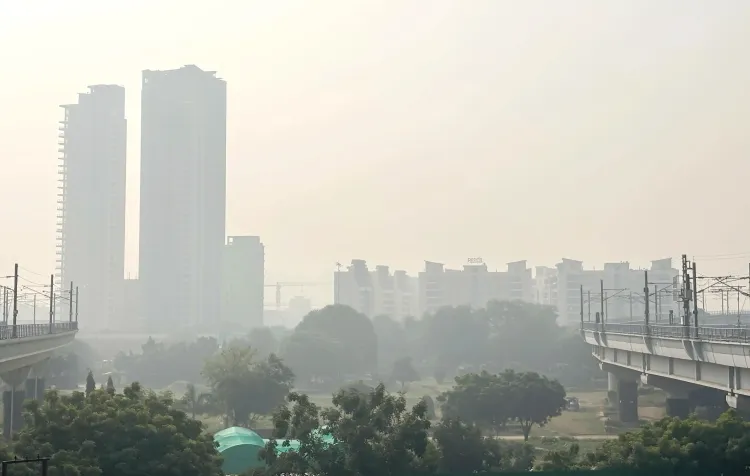Will Rising Air Pollution Lead to More Respiratory Issues, Strokes, and Heart Attacks?

Synopsis
Key Takeaways
- High AQI levels increase health risks
- Children and the elderly are more vulnerable
- Short-term and long-term health effects are severe
- Preventive measures are essential
- Authorities are taking action to mitigate pollution
New Delhi, Oct 20 (NationPress) As the national capital faced hazardous air conditions on Monday morning, with the Air Quality Index (AQI) dropping into the “very poor” range, health professionals raised alarms regarding a potential rise in respiratory diseases, stroke, and heart attacks, among other health issues.
The Central Pollution Control Board (CPCB) reported an AQI of 335 at 8 am on Diwali morning, following the widespread use of firecrackers the night before, which not only generated intense noise pollution but also enveloped Delhi-NCR in a thick layer of smoke.
The CPCB predicts a continuing decline in air quality over the next few days, with expectations for it to reach the “severe” category on Tuesday and Wednesday.
“Increased exposure to air pollution has both short-term and long-term health implications. Short-term effects include worsening asthma, Chronic Obstructive Pulmonary Disease (COPD), shortness of breath, and eye irritation. Prolonged exposure can result in cardiovascular diseases, stroke, heart attack, dementia, and mental health challenges,” explained Dr. Harshal R Salve, an Additional Professor at the Centre for Community Medicine at AIIMS, New Delhi, in an interview with IANS.
Dr. Salve pointed out that children, individuals over 60 years of age, and those with existing health conditions are particularly susceptible to the adverse effects of air pollution.
On Sunday, the city’s average AQI reached 296 ('poor'), climbing to 300 by 6 p.m. and hitting 302 by 7 p.m., thereby entering the 'Very Poor' classification, as reported by the CPCB.
Air quality in the capital is anticipated to decline further, as the Supreme Court has permitted the use of green crackers for a limited duration.
“In recent days, pollution levels in Delhi have surged, exacerbating the conditions of individuals suffering from respiratory ailments or allergies. This situation is expected to worsen if significant firecracker use occurs during the festival,” stated Dr. Ujjawal Parakh, a senior consultant in chest medicine at a prominent hospital in Delhi, to IANS.
“This period poses significant risks for individuals with respiratory conditions, as they may experience heightened symptoms,” Dr. Parakh added.
Dr. Salve emphasized the need for stringent measures to cut emissions, such as implementing bans on diesel vehicles, managing dust at construction sites, and regulating industrial emissions. At the individual level, it is crucial to refrain from burning waste and stubble while opting for sustainable energy sources.
He also advised against outdoor activities in the early morning, recommended wearing an N95 mask when outside, and encouraged the consumption of fruits and vegetables (up to five servings daily), particularly citrus fruits rich in antioxidants, to mitigate the effects of air pollution.
“Patients with respiratory conditions should continue their prescribed medications and ideally stay indoors in air-conditioned rooms to minimize pollution exposure during high AQI periods,” Dr. Parakh noted.
In response to the escalating air quality crisis, the Commission for Air Quality Management (CAQM) in the NCR and nearby regions has swiftly activated Stage-II of the Graded Response Action Plan (GRAP).
CAQM has also called on residents to utilize public transport, avoid dusty construction activities, and refrain from burning waste.









